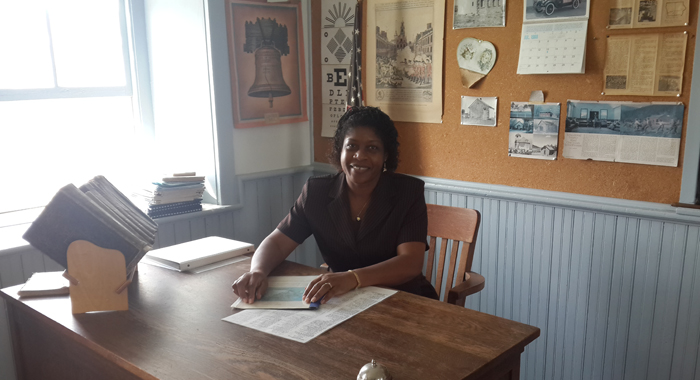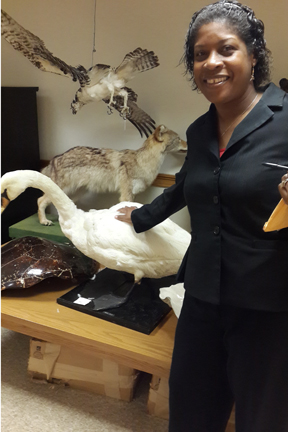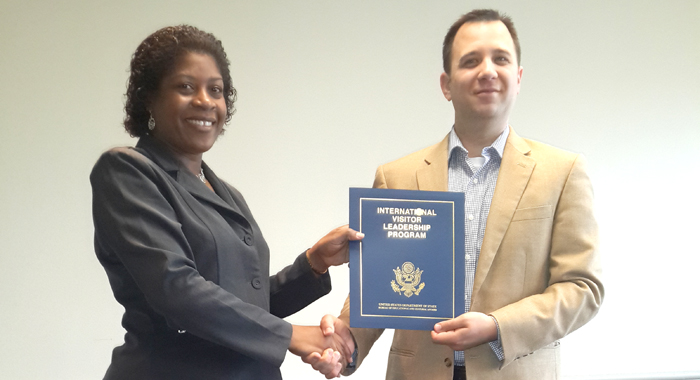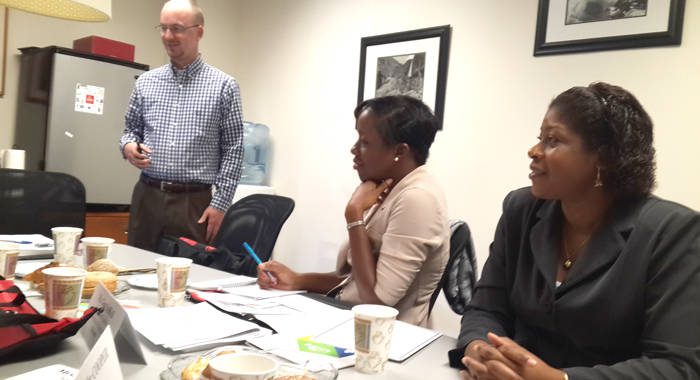A Vincentian educator who participated in a three-week exchange programme in the United States focused on special education has identified “greater need for advocacy for persons with disabilities” in St. Vincent and the Grenadines (SVG).
“It is particularly important to empower persons with disabilities to advocate for themselves,” Mavis Findlay-Joseph, an education officer at the Ministry of Education told I-Witness News after completing the programme.
Findlay-Joseph was the candidate from SVG who participated in the United States Department of States-sponsored International Visitors’ Leadership Program (IVLP), under the theme, “Comprehensive Education”, which focused specifically on “Education of the Exceptional Child”.
The IVLP, which is conducted through the U.S. Bureau of Educational and Cultural Affairs, is billed as “the U.S. Department of State’s premier professional exchange programme”.
Notable Caribbean alumni of the programme include, Owen Arthur, Lloyd Erskine Sandiford, Tom Adams,
Eugenia Charles, Portia Simpson-Miller, James Mitchell, Kamla Persad-Bissessar, Patrick Manning
Basdeo Panday, Stephenson King, and Denzil Douglas — all of whom became prime ministers in their countries.
Through short-term visits to the United States under the IVLP, current and emerging foreign leaders in a variety of fields experience the United States firsthand and cultivate lasting relationships with their American counterparts.
Professional meetings reflect the participants’ professional interests and support the foreign policy goals of the United States.
Findlay-Joseph participated in a programme that was conducted with eight candidates from Barbados and the Eastern Caribbean. There were three persons from Barbados and one each from Antigua and Barbuda, St. Kitts and Nevis, St. Lucia, Grenada and SVG.

The group visited the U.S. cities of Boston, Massachusetts; Des Moines, Iowa; Jackson Mississippi; and New Orleans, Louisiana.
The programme was geared at providing avenues for the discussion and exchange of best practices for curriculum design to support more effectively exceptional children at all stages of their education
Among other things, it also explored practical examples of programmes, techniques, methods and individualised instruction materials that have had positive results in retaining the interest of and achieving performance breakthroughs for exceptional children.
The programme was also designed to help participants ensure that policymakers and ministry officials understand the resources required to effectively help exceptional children develop intellectually, physically, emotionally and vocationally through appropriated and less restrictive individualised education programmes.

“The experience was a tremendous one for me as I got much greater insights into the lives of students with disabilities and the types of support structure that needs to be put in place to assist them,” Findlay-Joseph told I-Witness News, noting that the programme also allowed participants to enjoy the culture of the cities visited in the United States.
She said she plans to share resource materials brought back from the course and contacts information of professionals with colleagues at the Ministry of Education “to expand networking and collaboration.
“This can ultimately give rise to training in the form of workshops or through short online course. There is also the possibility of arranging for professionals to visit our island to build capacity where necessary. This can be arranged through the help of World Learning and the U.S. Embassy in Barbados,” she said.
During their stay in the United States, participants visited and interacted with relevant personnel at the U.S. Department of Education, educational institutions, ranging from pre-schools to universities, and agencies that advocate for persons with disabilities.
“Having served as a classroom teacher at various levels and now working closely with classroom teachers in the area of language and literacy, it was no surprise that I was naturally excited by the school visits,” Findlay-Joseph told I-Witness News.
Among the best practices that she observed in operation, Findlay-Joseph mentioned teachers engaging in differentiated instructions in a bid to meet adequately the needs of their students.
She said students were actively engaged in all of the classroom and cooperative learning was evident in many cases as students worked on activities in small groups.
Findlay-Joseph told I-Witness News print-rich classroom environment was also very evident with bold display of classroom rules and the vast majority of classrooms made use of information communication technology in a variety of ways that the students seemed to have enjoyed.
“The brief interaction with teachers and students was enjoyed as they wanted to learn more about our countries and how they compared to theirs. Many schools displayed icons/emblems to motivate students towards excellence such as a tiger or a bulldog.
“I was also heartened by the teachers’ willingness to share what they do with their students, for example, the types of reading programmes they employed to assess their reading levels,” she told I-Witness News.

Findlay-Joseph said that among the lessons learnt is that it is of utmost importance to support families that have disabled children.
“This should be done as soon as they have been identified as disabled. This would include training of family members as to how best to cater to the needs of the special need child,” she said, adding that each disabled child should learn through an individualised education plan.
“Policies must be put in place and enforced for the rights and privileges of disabled students and a greater effort should be made to empower disabled persons to be as independent as they can be — contributing to the development of the society as best they can,” she said.
Findlay-Joseph told I-Witness News that having completed the programme, she plans to collaborate more closely with the Special Needs and the Career Guidance Department, informing them of some of the novel ideas that were garnered.
“I believe the Schools for Children with Special Needs in our country can benefit from transition programmes similar to those observed at the various institutions where students are prepared in a very practical ways for the world of work even though they have disabilities of varying degrees. They receive training according to their abilities and are expected to be productive working citizens as far as possible,” she told I-Witness News.







While my heart goes out to children with learning disabilities and their parents, it seems that the more certificates our educators accumulate on their overseas duty-free shopping expeditions, the poorer the classroom learning outcomes of our students.
The same holds true for our police force whose elite have enough certificates to wallpaper a whole house while actual policing, the trust and respect people have for the police, and their ability to prevent and punish crime keep going down.